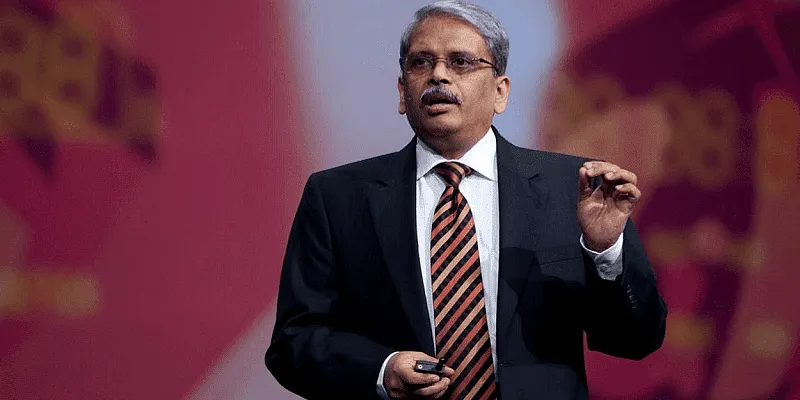India will have many billion-dollar startups despite current crisis, says Infosys co-founder
Infosys Co-founder and former CEO Kris Gopalakrishnan believes that the coronavirus pandemic hasn’t really changed prospects for the Indian startup ecosystem, which remains as lucrative as ever.
Infosys’ Co-founder and former CEO Kris Gopalakrishnan believes that despite the coronavirus crisis and its adverse impact on life and business, India will have a “large number” of unicorns (startups with $1 billion valuations), and will see “significant” investment.

Infosys Co-founder and former CEO Kris Gopalakrishnan
“Before the COVID-19 crisis started — let's say before March — we had 36 or 37 unique unicorns in India. So, we were actually a magnet for attracting investments. I just saw the news, which says that there are investors looking at Vodafone; Google is looking at Vodafone, Microsoft is also looking at Jio.
“This is enforcing the story that if you look beyond COVID-19, India is an attractive destination for talent, innovation, and markets, and nothing has changed during this [pandemic]. Yes, we have taken a temporary break but nothing has changed and I believe that we will have a large number of unicorns, we will have significant investments coming into India to take advantage of the opportunity that India provides,” Kris told India-focussed technology venture capital fund Chiratae Ventures (formerly IDG Ventures India) Chairman Sudhir Sethi, during a recent discussion on the ecosystem.
The coronavirus pandemic has hit the Indian startup ecosystem hard, with several players having to resort to layoffs and salary cuts to stay afloat. Unicorns like , , , and , have also had to downsize their staff as well as business. A Nasscom survey, conducted last month to study the impact of COVID-19 on Indian startups, found that 70 percent startups have less than three months of cash runway and around 40 percent have either temporarily shut down, or are on the verge of closing.
Incidentally, the Indian economy was going through its worst slowdown in a decade before the coronavirus crisis hit. The country’s growth fell to 3.1 percent in the quarter ending March, its slowest pace in 11 years.
Most economists believe the worst is yet to come and are of the opinion that the economy is staring at its worst recession in 40 years, and is expected to contract by at least five percent this fiscal.
But, despite all the gloom and doom in the economy and the startup ecosystem, Kris believes India’s fundamentals are strong, which will help the ecosystem bounce back.
He said, “In the short term, yes, the economy is taking a hit because of disparity in society, but in the medium-long term, none of the things which are positive about India have changed. The talent that we have is, I believe second to none, all the way from white-collar work to blue-collar work, from things like IT services to advance manufacturing or healthcare etc. Our healthcare system has actually demonstrated that it are able to step up to the challenges in spite of the poor healthcare infrastructure.
“Second, I strongly believe that in the future, we will use multiple exponential technologies to change industries in what is called the Fourth Industrial Revolution. And India is probably the best place to leverage these technologies for maximum benefits.”
The Fourth Industrial Revolution represents a fundamental change in the way we live, work and relate to one another, according to the World Economic Forum. Simply put, it refers to how modern technologies such as artificial intelligence (AI), robotics and the Internet of Things (IoT) are merging into human lives.
Advantage startups
Kris revealed that in his discussions with government officials, he was told that startups responded faster than established companies when it came to providing various solutions to tackle the COVID-19 pandemic. He said, “They said startups responded faster than established companies because they had less bureaucracy and less worries about what impact it would have on their business etc.”
The Infosys veteran also lauded startups for pivoting or repurposing their solutions to reach consumers during these unprecedented times, in a bid to stay relevant.
He added, “They're also looking at what new opportunities are being created during this crisis, they're looking at how to survive so that they can emerge stronger. I think the investors that are also working closely with the startups is very encouraging. The whole ecosystem has come together in order to make sure that although in the short term, there is going to be an impact. But in the medium to long term, they emerge out of this with as little damage and then are ready to take advantage of the positives that India provides.”
In the backdrop of all the chatter about the opportunity that exists, if the supply chain were to move from China to India, in wake of the current coronavirus crisis and escalating tensions between the US and the Dragon, Kris is placing his bets on technology startups and entrepreneurs.
He said, “I'm actually more optimistic in the short term about our technology entrepreneurs, our technology companies going global because it’s market penetration, it's maybe moving the production to a different geography or a different location than the manufacturing shifting to India. The reason being that the shifting of a physical operation takes a lot more effort, time and it is much more dependent on the environment than the ecosystem. The changes in the physical space take more time than changes in the digital space because most of the technology companies are delivering services on the digital space.”
Edited by Saheli Sen Gupta









